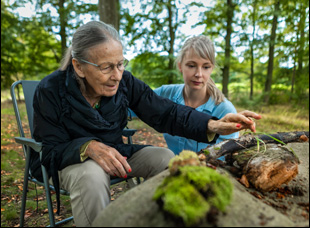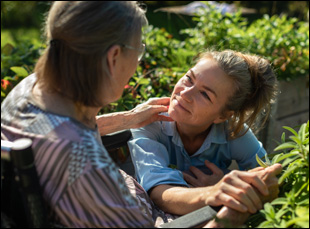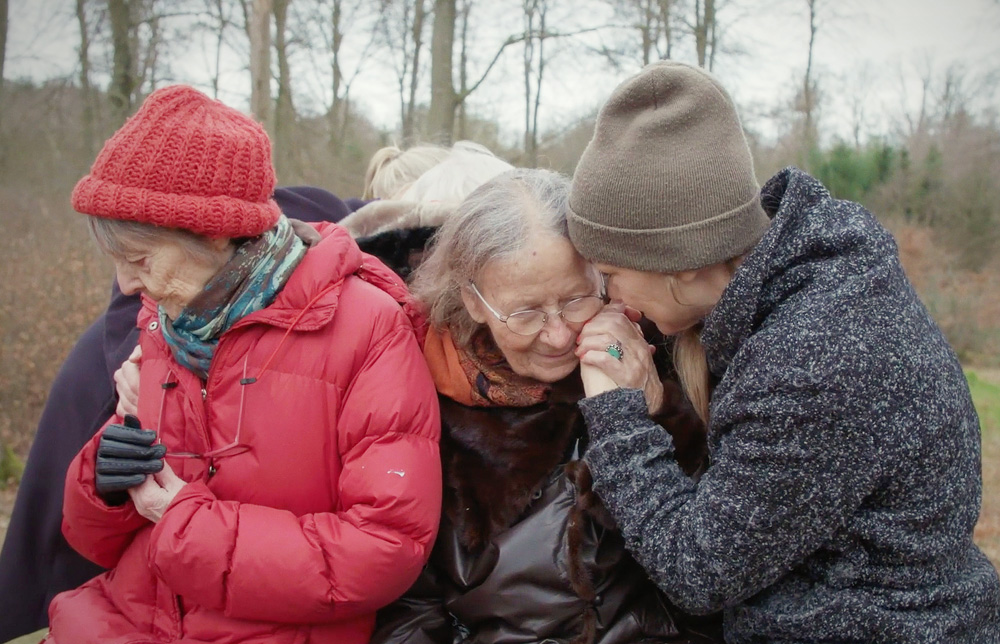The opening scenes of “It Is Not Over Yet” can’t help but be inviting, ushering audiences into Dagmarsminde, the home for the elderly in Denmark that May Bjerre Eiby spent seven years savings towards when there was nowhere else like it that she knew of. She would know better than most, working in many over the years as a nurse, but she became even more familiar when her own father experienced dementia and had to be moved to a full-time care facility, lamenting walking down halls where she could peer into rooms with one sedated patient after another, with only the hum of the dim fluorescent lights to break the silence. By contrast, there’s an immediate airiness to Dagmarsminde where residents can be seen knitting or enjoying the forest right outside, encouraged to engage with one another rather than sequester themselves to their rooms.
This wouldn’t seem to be a radical idea, but the care facility is controversial when Eiby insists on treating dementia without any medication, instead believing that an attentive and sensitive staff and an environment where no one feels alone in their struggle will yield more active and healthy patients in their golden years. Director Louise Detlefsen couldn’t help but be intrigued when she heard of Eiby’s unconventional treatment and set up in Dagmarsminde for a year to witness the therapy in person, and “It Is Not Over Yet” follows its central subject’s gentle and humane approach to bringing out the best in people. Gravitating towards Vibeke and Torkild, a married couple of 63 years who arrive at the home when Vibeke’s fading memory starts to become a cause for concern, the film can’t help but be an ensemble piece when Eiby and her staff find every opportunity for group activities, celebrating birthdays and other milestones to prevent a feeling of isolation from setting in and creating an atmosphere where residents aren’t forced into anything but tend to naturally follow their interests, keeping their minds sharp.
Beyond the idyllic, woodsy locale, the beauty of human nature is on full display in “It Is Not Over Yet” where all the considerations of Eiby and her staff afford the residents as much a semblance of their lives before moving in to Dagmarsminde as possible, even as the administration grapples with refining their methodology without any other model to handle end-of-life situations. With the film making its premiere at Hot Docs this week, Detlefsen and Eiby spoke about the delicate process of opening up the facility to cameras and conveying what’s so special about it, as well as putting Eiby’s innovations into perspective and the film’s capacity to enable others afflicted with dementia to feel less alone.

Louise Detlefsen: I’ve never imagined ever that I would make a film about a nursing home, but then I heard some couple of years ago May on the radio talking about people with dementia. She had this very optimistic approach, and she said that, treated the right way, you could actually be happy and have a fun life even if you have severe dementia, so that really made me curious and I called her. That was the starting point, and we had some meetings to talk about what we wanted to do and how I work.
I started by coming to the nursing home myself. Then I came with a camera and after a while I brought a photographer, but we were only a team of two people. Of course, I talked to all the relatives, so they would feel comfortable with us filming and we made an agreement with May that if she had the feeling that somebody wasn’t comfortable, she could just stop us at any time. But we got to know people and if somebody got irritated, I think we could sense it and we never came into any conflicts. May and the staff were really open and wanted to bring us along, but in a very sensitive way.
May, was this a welcome prospect when Louise came calling?
May Bjerre Eiby: Yeah, it was good. We have had so many [interviews] for television at my care home, and we were actually a little bit tired of it at that time. [laughs] But because Louise had the intention of making a documentary with the sense of our values, I really enjoyed speaking to her from the first day, and I had a good feeling about the film.
Louise, I imagine you might not have had too many expectations going in, but did anything rise to the surface that took you in a different direction than planned?
Louise Detlefsen: I didn’t know the residents before I came there, so it has been so valuable to get to know all these protagonists, especially there’s a couple [Vibeke and Torkild] moving in at the beginning of the film, that we follow throughout and the [husband Torkild] doesn’t want to go into a nursing home. He’s really frustrated and a bit aggressive, and you could just feel the way that May and the staff make him be comfortable with the place, and he enjoys the stars and the flowers. He was like a father figure in the film. That surprised me that I got to really be so fond of them on a personal level.

May Bjerre Eiby: Yeah, when you see how we use our hands and how we use our eyes when we work with the residents — how we work with the closeness — that was most important thing for me [to see in the film], to show the people what you can actually do with compassion. One of the most important parts for me to have in the film was the part where we talk about working without medicine because that’s a new way of working with dementia — that you go away from the medicine and work well with the natural tools, like [getting in touch with nature by] going to the woods and going to the garden and touch people physically. I think it’s all there, and you could always continue. Also [I liked how the film showed] the way that we look at life as a circle — when it’s a circle of life, you die, and then you bring life into the care home after someone dies, and I think that’s beautifully captured in the film.
Louise Detlefsen: It was interesting to follow May and the staff and the treatment. Early on, I decided that I would do like an ensemble documentary, that I would follow multiple characters because everybody is affected in a different way by the dementia and by showing different characters, I could really try to portray that because you always tell the story from the relatives’ point of view — how sad it is to lose somebody to dementia, but [I wondered] how it is to live with it. You can actually have quite a happy life, so I decided to make it a collective story early on and then tried to patch it together in the editing room.
When I imagine you’re so immersed in this experience, what’s it like to see it reflected back? Do you actually get something out of it?
May Bjerre Eiby: Yeah, a lot, and also my staff does, but it’s also about feeling that my project and my ideas about nursing and caring for these people gets out in the world and that I can tell about what can we actually do in this little, tiny place in Denmark. That’s quite important for me and also for the dementia field, showing how there is an alternative to the way we treat dementia today. [And as far as filming] maybe these people with dementia are the easiest people to film because they really don’t notice the camera. When they just start to talk and when they’re together with the house and with the community, they focus on that, so what you see in the film comes out so natural. There’s nothing that is placed there.
What’s it like getting to the finish line with it and starting to get it out into the world?
Louise Detlefsen: We have been working on it in crazy times because of Corona, and the filming process had been really stressful, so now that it has been selected for Hot Docs and coming out into the world, it feels so good. At the same time, we’re just longing for it to come to cinemas where you can sit with other human beings, because this film is really about human contact. So it’s fantastic [it’s premiering virtually] and I hope that it will have a great life, but I cannot wait to see it with other people [in person].
“It Is Not Over Yet” will be available for streaming through Hot Docs, geoblocked to Canada, from April 29th through May 9th.




